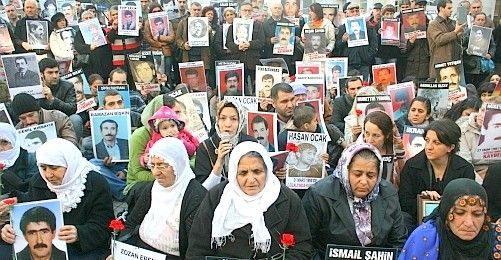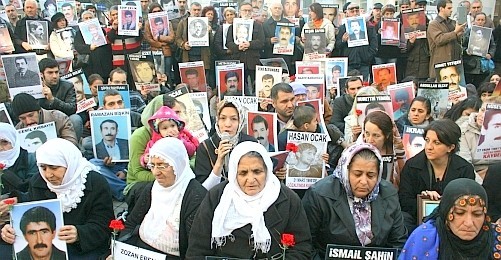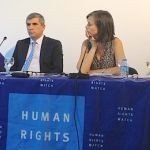HUMAN RIGHTS WATCH REPORT
Ending Impunity for Killings and Disappearances


Human Rights Watch (HRW) issued a 68 page long report on Monday called "Time for Justice: Ending Impunity for Killings and Disappearances in 1990s Turkey."
"Turkey's modern history has been marked by impunity for serious human rights abuses highlighted by the state's systematic failure to hold to account members of the security forces and other public officials for serious violations in the decades following the September 1980 military coup. In the 1990s, during the armed conflict between the Turkish military and the Kurdistan Workers' Party (PKK), government military and security forces compelled hundreds of thousands of people to abandon their villages, and carried out enforced disappearances and killings of thousands of civilians," the report said.
Despite the lack of any progress in bringing the culprits to justice, a case that began in 2009 in the southeastern province of Diyarbakır, involving retired gendarmerie colonel Cemal Temizöz, three PKK members turned informants and three members of the "village guard" (local paramilitary forces armed and directed by the gendarmerie,) marked a notable milestone, according to the report.
"The prosecution accused the defendants of working as a criminal gang involved in the killing and disappearance of twenty people in and around the Cizre district of Şırnak province between 1993 and 1995," said the report.
"A climate of fear"
The Temizöz case is particularly significant, as ret. Col. Temizöz is the highest ranking officer ever to stand trial for such abuses, and the procession of the trial therefore provides a unique opportunity to examine the obstacles that lie before the fulfillment of justice, according to the report.
Authorities' failure to implement adequate measures for the protection of witnesses, the limited scope of the investigation with respect to the rank and position of responsible parties and court officials' largely muted responses to acts of intimidation and threats against the witnesses and lawyers represent significant hurdles, the report noted.
The Human Rights Watch report also underscored the locals' fright and terror which brought any hopes for justice to a grinding halt:
"Many witnesses in the Temizöz trial have testified to a pervasive fear felt by victims' relatives at the time of the crimes. İsmet Uykur, who had witnessed his father Ramazan Uykur's murder in Cizre town in broad daylight in February 1994, described to the court the overwhelming climate of fear that predominated at that time: 'At that time fear triumphed in Cizre. In those days we were unable to go and lodge complaints because there were many unresolved killings... there were people who had seen the incidents in the region but at that time they wouldn't be witnesses because of their fear; in those days we were afraid of the gendarmerie and the village guards.'"
The report also quoted Nurettin Elçi, who left Turkey after he discovered his brother Ramazan Elçi's body in an unmarked grave about to be covered with earth:
"I let out a great cry at the shock of seeing my brother's body before me in the grave. Immediately after that I escaped Cizre and stayed away for many years. We couldn't even have a wake (taziye) for my brother. No one would have dared come. All the men escaped during that period, sometimes leaving women behind. We returned many years later when the situation there had got better. Many of our relatives fled to northern Iraq as well, and are now in the Mahmur Camp or other places," Elçi had said.
Statute of limitations
"Statutes of limitations exist to protect defendants against unjust prosecutions. But the documented failure of the Turkish authorities to provide effective investigation of human rights violations or to put in place concrete measures to tackle a pattern of impunity for state officials should not be reinforced and even legitimized by insisting on the strict application of a 20-year statute of limitations, which means that the prosecution of many cases may soon become time-barred. In such cases statutory limitations risk becoming a further means of denying justice to victims," the report said.
The report further highlighted the role of the "village guards" who were also responsible for a great deal of the abuses that took place in the southeast during the time period in question.
Key Recommendations
The report provided a number of recommendations to follow:
*The Turkish government should ensure, by legislation if necessary, that the statute of limitation for unlawful killings and other serious human rights violations by suspected state perpetrators in Turkey is not a bar to prosecution.
*Prosecutors and courts should ensure that witnesses deemed vulnerable or at risk of reprisals are able to benefit from the provisions of the Witness Protection Law, including testifying in court without their identities revealed to the defendants, while also upholding the right of the defendants and their lawyers to cross-question such witnesses.
*The Higher Board of Judges and Prosecutors should ensure that the investigation of past serious human rights abuses by suspected state perpetrators-including enforced disappearances, killings, and torture-is handled by dedicated prosecutors who are not simultaneously charged with taking on regular criminal investigation on a day-today basis.
*Prosecutors and courts should investigate possible chain of command involvement in serious human rights violations or dereliction of duty of senior security personnel for failure to prevent human rights abuses. This must entail examination of local, regional, and national command structures.
*The Turkish government should provide necessary resources to accelerate trials, with more attention to greater pre-trial preparation and more regular hearings, including holding hearings on consecutive days, in order to assist in the protection of witnesses and victims and their families, to strengthen their trust in the justice system, and also to uphold the fair trial rights of defendants.
*The Grand National Assembly of Turkey should establish an independent parliamentary truth commission to investigate disappearances, killings, and other serious human rights violations by suspected state perpetrators in the period since the September 12, 1980 military coup. (NV)




